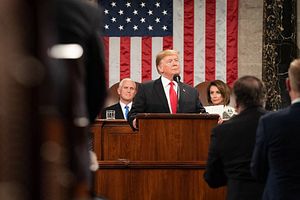If people were expecting a detailed diatribe on the dangers that America faces from China during President Donald Trump’s State of the Union address to Congress on Tuesday night, then they were sorely disappointed.
His relative silence on the U.S.-China relationship would indicate one of two things. First, ongoing trade negotiations are at such a sensitive point that public discussion risks derailing a final agreement.
Or, Trump’s lack of elaboration signals that in fact no deal is imminent, suggesting that that further tariffs on Chinese imports into the United States, as promised, will be levied.
Either way, it was not by accident that Trump’s comments on China were brief, and offered little new information.
Commentators had predicted that China issues would form a major part of Tuesday night’s speech.
On the contrary, China was referred to in only two contexts in the State of the Union, the audience for which included a joint session of Congress, the Supreme Court, the Joint Chiefs of Staff, Cabinet secretaries, and a gallery of invitees.
Trump, who is known for tactics that are designed to maneuver, mislead, and misguide adversaries, stated, as he has many times, that he has “great respect for President Xi,” referring to Chinese President and Communist Party leader Xi Jinping.
Trump, also known for keeping his cards close to his chest when a deal is under discussion, nonetheless reiterated an indictment of China’s trade and technology practices, which has formed a major plank of his foreign policy approach.
“One priority is paramount,” Trump said. “Reversing decades of calamitous trade policies.”
He continued, “We are now making it clear to China that after years of targeting our industries, and stealing our intellectual property, the theft of American jobs and wealth has come to an end.”
But Trump also used the occasion, one rich in ritual and American political traditions, to let China off the ideological hook for its purported behavior.
“I don’t blame China for taking advantage of us. I blame our leaders and representatives for allowing this travesty to happen.”
The U.S. president has made this point many times before, and in fact it is a popular point among his base. (Corporations are often an easy target for all manners of ills. In in the case of China’s acquisition of American jobs and technology, it can be empirically shown that American companies do, indeed, deserve their fair share of the responsibility.)
Yet, using one of the most watched American political events of the year, under the dome of the U.S. Capitol, to effectively call China a thief elevates the charge beyond that of a campaign rally in an aging sports arena.
Adding to the sting, Trump monetized it.
Referring to the tariffs that have been in place since mid-2018, Trump added, “Now our Treasury is receiving billions of dollars a month” from those tariffs.
What went unsaid, however, was any mention of China’s military expenditures, clearly designed to challenge America. Trump also stayed away from South China Sea issues, and China’s recent successes in space. There was also no comment on China’s economic adventures in Africa, Central Asia, the Middle East, and South America. Nor did the Arctic, cyber warfare, or any mention of China’s worsening record on human rights come up.
However, leaving those issues aside, which are equally, and in some cases, more contentious than the trade issue, does not mean that the American president is unconcerned with their effect or impact.
Trump and his administration appear to clearly understand that the foundation for all of the other issues on which China can be challenged and, in some cases, chastised, is its financial ability to achieve its goals in every sphere of its bold new engagement with the world.
And its trade relationship with the United States is a major pillar of that financial foundation.
In Trump’s only other reference to China in his 82-minute speech, the president suggested that, in withdrawing from the Intermediate-range Nuclear Forces Treaty (INF), a different arrangement could be made.
“We really have no choice. Perhaps we can negotiate a different agreement, adding China and others, or perhaps we can’t — in which case, we will outspend and out-innovate all others by far.”
But possibly the loudest silence on China in Trump’s far-ranging speech was on the subject of North Korea.
Announcing that he and North Korean leader Kim Jong Un will meet for a second summit on February 27 and 28 in Vietnam, Trump made no mention of Xi Jinping’s role in that relationship, perhaps one of the most delicate in international politics today.
Although it is speculated that Trump and Xi may meet during Trump’s trip, by essentially ignoring that possibility in favor of highlighting a confirmed summit with the leader of China’s client-state, Trump has signaled to the Chinese exactly who it is most important for him to meet at this time.
Because if trade talks don’t work out, more tariffs are coming. And this time, the Chinese shouldn’t be surprised.

































